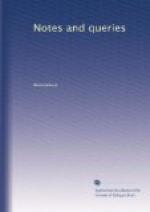CHAS. PASLAM.
Midwives Licensed (Vol. ii., p. 408.).—On this subject I would refer S.P.H.T. to Burn’s Ecclesiastical Law, under the head of “Midwives,” which is all nearly that can be ascertained at present on that head. Among other things it says in the oath taken of them,—
“You shall not in anywise
use or exercise any manner of witchcraft,
charm, or sorcery, invocation,
or other prayers, than may stand with
God’s law and the king’s.”
M.C.R.
Dr. Timothy Thruscross (Vol. ii., p. 441.)—There are frequent notices of Dr. Thristcross, or Thruscross, in Dr. Worthington’s correspondence. (See Vol. i. of same, edited for the Chetham Society. Index, voc. “Thristcross.”) Dr. Worthington observes, p. 219., “I did love to talk with worthy Mr. Thirstcross, who knew Mr. Ferrar and Little Gidding.”
JAS. CROSSLEY.
{45}
History of Bohemian Persecution (Vol. ii., p. 358.).—See note to Worthington’s Diary and Correspondence, vol. i. p. 154., for a notice of this work of Comenius, and his other publications relating to the Bohemian church.
JAS. CROSSLEY.
“Earth has no Rage” (Vol. iii., p. 23.).—
“Earth has no rage like love to
hatred turn’d,
And hell no fury like a woman scorn’d.”
These are the concluding lines of Act III. of Congreve’s Mourning Bride. They stand, however, thus, in the edition to which I have referred:
“Heaven has no rage like love to
hatred turn’d,
Nor hell a fury like a woman scorn’d.”
JAS. CROSSLEY.
Manchester, 11. Jan. 1851.
Couplet in De Foe (vol. ii., p. 310.).
“Restraint from ill is freedom to
the wise,
And good men wicked liberties despise.”
The couplet is altered from the following couplet in De Foe’s True Born Englishman:—
“Restraint from ill is freedom to
the wise,
But Englishmen do all restraint despise.”
See collection of his writings, vol. i. p. 20., edit. 1703.
JAS. CROSSLEY.
Private memoirs of Queen Elizabeth (Vol. iii., p. 23.).—“The Secret History of the most renowned Queen Elizabeth and the Earl of Essex. In two parts. By a person of Quality. Cologne: printed for Will with the Wisp, at the Sign of the Moon in the Ecliptick. M.D.CLXXXI.”—is the title of a small volume in my possession, containing some curious hints corroborative of the first part of Mr. Ives’ MS. note mentioned in “NOTES AND QUERIES” (Vol. iii. p. 11.). If this be the book to which your correspondent, J.E.C., refers in your last number, he is perfectly welcome to the perusal of my copy.
WILLIAM J.D. ROPER.
Vane House, Hampstead, Jan. 18. 1851.




